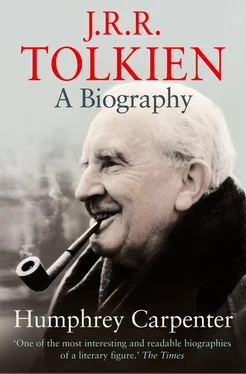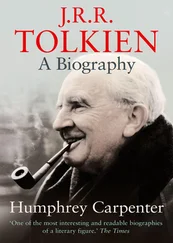It may seem strange that Ronald did not simply disobey Father Francis and openly continue the romance. But the social conventions of the time demanded that young people should obey their parents or guardian; moreover Ronald had great affection for Father Francis, and depended on him for money. Nor was he a rebellious young man. Given all this, it is scarcely remarkable that he agreed to do as he was told.
At the height of the storm about Edith, Ronald had to go to Oxford to take the scholarship exam. If he had been in a calmer state of mind he would have revelled in his first view of Oxford. Seen from Corpus Christi College where he was staying, the towers and parapets offered him a prospect of which his school was but a poor shadow. Oxford was new to him in every way, for his ancestors had never been university people. Here now was his chance to win honour for the Tolkiens and the Suffields, to repay Father Francis’s affection and generosity, and to prove that his love for Edith had not distracted him from his work. But it was not so easy. Looking at the notice-board after the examination, he saw that he had failed to obtain an award. He turned his back in misery on Merton Street and Oriel Square and walked to the railway station, perhaps wondering if he would ever return.
But in truth his failure was neither surprising nor disastrous. Competition for Oxford scholarships was always extremely severe, and this had been only his first attempt. He could try again next December, although by that time he would be nearly nineteen, and if he failed once more to win an award there would be no chance of his going to Oxford, for a commoner’s fees would be beyond his guardian’s pocket. Clearly he must work much harder.
‘Depressed and as much in dark as ever,’ he wrote in his diary on New Year’s Day 1910. ‘God help me. Feel weak and weary.’ (It was the first time that he had kept a diary; or at least this is the first of his diaries that was preserved. Now, as later in life, he used it chiefly as a record of sorrow and distress, and when later in the year his gloom dissipated he ceased to keep up the diary entries.) He was faced with a dilemma, for though he and Hilary had moved to new lodgings they were not far from Mrs Faulkner’s house, where Edith was still living. Father Francis had demanded that the love affair be broken off, yet he had not specifically forbidden Ronald to see Edith. Ronald hated to deceive his guardian, but he and Edith decided to meet clandestinely. They spent an afternoon together, taking a train into the countryside and discussing their plans. They also visited a jeweller’s shop, where Edith bought Ronald a pen for his eighteenth birthday, and he purchased a ten-and-sixpenny wrist-watch for her twenty-first, which they celebrated in a tea-shop the next day. Edith had now decided to accept an invitation to go and live in Cheltenham with an elderly solicitor and his wife, who had befriended her. When she told this to Ronald he wrote ‘Thank God’ in his diary, for it was the best solution.
But once again they had been seen together. This time Father Francis made his attitude quite clear: Ronald must not meet or even write to Edith. He could only see her once more, to say goodbye on the day she left for Cheltenham. After that they must not communicate again until he was twenty-one, when his guardian would no longer be responsible for him. This meant a wait of three years. Ronald wrote in his diary: ‘Three years is awful.’
A more rebellious young man might have refused to obey; even Ronald, loyal to Father Francis, found it hard to follow his guardian’s wishes. On 16 February he wrote: ‘Last night prayed would see E. by accident. Prayer answered. Saw her at 12.55 at Prince of Wales. Told her I could not write and arranged to see her off on Thursday fortnight. Happier but so much long to see her just once to cheer her up. Cannot think of anything else.’ Then on 21 February: ‘I saw a dejected little figure sloshing along in a mac and tweed hat and could not resist crossing and saying a word of love and cheerfulness. This cheered me up a little for a while. Prayed and thought hard.’ And on 23 February: ‘I met her coming from the Cathedral to pray for me.’
Though these meetings were accidental, there was the worst possible consequence. On 26 February Ronald ‘had a dreadful letter from Fr. F saying I had been seen with a girl again, calling it evil and foolish. Threatening to cut short my University career if I did not stop. Means I cannot see E. Nor write at all. God help me. Saw E. at midday but would not be with her. I owe all to Fr. F and so must obey.’ When Edith learnt what had happened she wrote to Ronald: ‘Our hardest time of all has come.’
On Wednesday 2 March, Edith set out from Duchess Road to go to her new home in Cheltenham. In spite of his guardian’s ban, Ronald prayed that he might catch a final glimpse of her. When the time for her departure came he searched the streets, at first in vain. But then: ‘At Francis Road corner she passed me on bike on way to station. I shall not see her again perhaps for three years.’
CHAPTER IV ‘T.C, B.S., ETC.’
Father Francis was not a clever man, and he did not perceive that by compelling Ronald and Edith to part he was transforming a boy-and-girl love-affair into a thwarted romance. Ronald himself wrote thirty years later: ‘Probably nothing else would have hardened the will enough to give such an affair (however genuine a case of true love) permanence.’
In the weeks after Edith’s departure he was morbid and depressed. There was little help to be gained from Father Francis, who was still deeply offended at the deception that had been practised upon him. At Easter, Ronald asked for his guardian’s permission to write to Edith, and this was granted, though grudgingly. He wrote; and she replied, saying that she was happy in her new home, and that ‘all that horrid time at Duchess Road seems only a dream now’.
Indeed she came to find life at Cheltenham to be most congenial. She was staying in the house of C. H. Jessop and his wife, whom she called ‘Uncle’ and ‘Auntie’ though they were not actually related to her. ‘Uncle’ was inclined to be grumpy but ‘Auntie’ always made up for this with kindness. There were few guests at the house beyond the vicar and elderly friends of the Jessops, but Edith could find companionship of her own age with her school-friend Molly Field whose family lived nearby. She practised the piano every day, took lessons on the organ, and began to play for services at the Anglican parish church, which she attended regularly. She involved herself in church affairs, assisting at the Boys’ Club and the choir outings. She joined the Primrose League and went to Conservative Party meetings. She was making a life of her own, a better life than she had known before, which she would find it hard to relinquish when the time came.
For Ronald, school now became the centre of life. Relations with Father Francis were still strained, and the Oratory could not entirely retain its former place in his affections. But at King Edward’s he found good company and friendship. It was a day-school, and there were no ‘Tarts’ or ‘Bloods’ such as revolted C. S. Lewis at his boarding-school (later described by him in Surprised by Joy). Certainly the older boys did have prestige in the eyes of the younger, but it was the prestige of age and achievement rather than of caste, while as to homosexuality Tolkien claimed that at nineteen he did not even know the word. Nevertheless it was into an all-male society that he now threw himself. At the age when many young men were discovering the charms of female company he was endeavouring to forget them and to push romance into the back of his mind. All the pleasures and discoveries of the next three years – and they were vital years in his development, as vital as the years with his mother – were to be shared not with Edith but with others of his sex, so that he came to associate male company with much that was good in life.
Читать дальше












